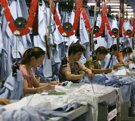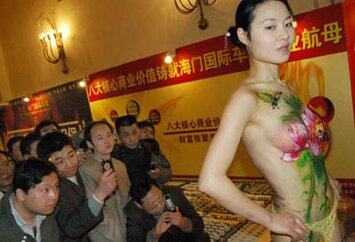IndCoup noted an article last week by ex-World Bank chief economist Joseph Stiglitz praising Chinese planning. Sarapan Ekonomi, an Indonesian economics blog, .
IndCoup ponders Joseph Stiglitz’s praise on China’s miraculous economic development, on which Greenstump speculates that IndCoup “believes China is a model Indonesia should follow”.
Regardless, in terms of economic growth, poverty reduction, and population control, Indonesia is every bit as “miraculous” as China.

Since the late 1960s, both Indonesia and China has been growing fast. Moreover, as shown in the graph above, average Indonesians had been always richer than people of China. Until the 1998 financial crises, that is, when the Indonesia’s economy shrank by 13 percent and has been growing slower since.
Still, Indonesia’s poverty today is in no way worse than China’s; For example, China’s poverty gap at $1 a day (a measure of incidence and depth of poverty) is 4 percent, while Indonesia’s is less than 1 percent.
AsiaPundit also took exception with the Stiglitz article which starts out with this premise.:
Part of the key to China’s long-run success has been its almost unique combination of pragmatism and vision. While much of the rest of the developing world, following the Washington consensus, has been directed at a quixotic quest for higher GDP, China has again made clear that it seeks sustainable and more equitable increases in real living standards.
It surprises AP that Stiglitz, after three years of working with the World Bank, would feign such ignorance. Since the Deng Xiaoping-era China has consistently put emphasis on GDP growth over income equality or social welfare. The shift he is now praising is largely a creation of the newest five-year plan.
That said, AP agrees that much of the five-year plan is reasonable. It’s largely agreed that more even income distribution and stronger domestic consumption are needed. The fallen tigers of ‘97, generally, did not consider the importance of domestic demand until after their export-driven economies collapsed. China is wise to do so now.
The respective rebounds of the victims of ‘97, in part, were based upon how quickly they shifted to policies that stoked domestic demand.
South Korea quickly cleared bad loans and, in a rather insane manner, promoted consumption through personal debt (creating a new credit crisis in the process), Thailand did less but it did extend rural credit and ran a moderately successful asset management program for debt. Indonesia struggled with political turmoil and indecision for most of the post-1997 years. AP will not speculate on how China will fare.
That China is preemptively addressing issues that the rest of Asia did after 1997, and after Japan’s bubble burst, is welcome. However, AP is not confident that the country will do so successfully before its own imminent correction.
China’s miracle is impressive. So too were Korea’s, Thailand’s and Indonesia’s. AP will withhold judgement on how China’s overall economic management rates until after he sees how the country responds to a deep recession. He will give the state some credit, for instance, this is far more sensible than anything he was hearing from the pre-1997 Bank of Korea. But broader comparisons of China and Indonesia will be withheld until the former has its crisis.
Technorati Tags: china, east asia, indonesia, northeast asia, southeast asia


 WASHINGTON — People who melt pennies or nickels to profit from the jump in metals prices could face jail time and pay thousands of dollars in fines, according to new rules out Thursday.
WASHINGTON — People who melt pennies or nickels to profit from the jump in metals prices could face jail time and pay thousands of dollars in fines, according to new rules out Thursday.
 As we have not heard any reports of the melting of the Chinese yuan, we assume that either the nickel-plated steel material is worth more in coin rather than base-metal form or that owners of blast furnaces in China are betting on further appreciation of the local currency.
As we have not heard any reports of the melting of the Chinese yuan, we assume that either the nickel-plated steel material is worth more in coin rather than base-metal form or that owners of blast furnaces in China are betting on further appreciation of the local currency. BEIJING: A village cashier in west China lost 12,500 US dollars of public money after it was eaten by goats.
BEIJING: A village cashier in west China lost 12,500 US dollars of public money after it was eaten by goats. SPIEGEL: The U.S. economy is increasingly dependent on the willingness of the Chinese and other Asian countries to buy huge quantities of U.S. dollars to keep the currency from crashing. Is America’s monetary independence under threat?
SPIEGEL: The U.S. economy is increasingly dependent on the willingness of the Chinese and other Asian countries to buy huge quantities of U.S. dollars to keep the currency from crashing. Is America’s monetary independence under threat?
 Unlike the crude state-sponsored videos that glorified the September 11 terrorist attacks as a humiliating strike against an arrogant superpower, the planned multipart production promises to be a slick dissection of American economic and military might.
Unlike the crude state-sponsored videos that glorified the September 11 terrorist attacks as a humiliating strike against an arrogant superpower, the planned multipart production promises to be a slick dissection of American economic and military might. The Chinese are much more adventurous than Europeans and Americans when it comes to sex toys, said Wu Hui , chairman of Wenzhou Adam and Eve Health Products. “It’s strange. Among the countries we export to - developed countries in Europe and the Americas - they like simplicity. In China, they want more functions.”…
The Chinese are much more adventurous than Europeans and Americans when it comes to sex toys, said Wu Hui , chairman of Wenzhou Adam and Eve Health Products. “It’s strange. Among the countries we export to - developed countries in Europe and the Americas - they like simplicity. In China, they want more functions.”… South-East Asia’s biggest sex market that is, though I always expected Thailand, or Korea or Japan who have the first three places when it comes to matters of size, located off
South-East Asia’s biggest sex market that is, though I always expected Thailand, or Korea or Japan who have the first three places when it comes to matters of size, located off  Concerns about a dollar crisis can be divided into two questions: Will there be a plunge in the dollar? Will this plunge have nasty macroeconomic consequences?
Concerns about a dollar crisis can be divided into two questions: Will there be a plunge in the dollar? Will this plunge have nasty macroeconomic consequences?



 DETROIT—Detroit, a former industrial metropolis in southeastern Michigan with a population of just under 1 million, was sold at auction Tuesday to bulk scrap dealers and smelting foundries across the United States.
DETROIT—Detroit, a former industrial metropolis in southeastern Michigan with a population of just under 1 million, was sold at auction Tuesday to bulk scrap dealers and smelting foundries across the United States. For a start, the bilateral imbalance may be overstated. After ironing out the wide discrepancies between both sides’ data, Oxford Economics, a consultancy, finds China’s share has hovered at about a fifth of the total US merchandise deficit since 1995. That suggests the former is as much a result as a cause of the latter’s growth. Heaping all the blame on China would be off the mark, even if US manufacturing were dying.
For a start, the bilateral imbalance may be overstated. After ironing out the wide discrepancies between both sides’ data, Oxford Economics, a consultancy, finds China’s share has hovered at about a fifth of the total US merchandise deficit since 1995. That suggests the former is as much a result as a cause of the latter’s growth. Heaping all the blame on China would be off the mark, even if US manufacturing were dying.



 The Chinese government accepted the resignation of Hong Kong’s chief executive, Tung Chee-hwa, in March 2005. Mr Tung’s unsuccessful attempts to force through unpopular national security legislation in 2003 had prompted demonstrations attended by several hundred thousand. The appointment of a new chief executive, Donald Tsang, previously a leading civil servant, eased tensions, and pro-government parties did well in September 2004 elections for the Legislative Council (Legco). However, Mr Tsang’s plans for electoral reform were voted down in December 2005 by pro-democracy parties, who wished to see a faster move towards universal suffrage. The Chinese government has ruled out early moves towards full democracy, and there are fears that clashes between China and Hong Kong politicians over democracy in the territory could have repercussions for political stability in China as China’s leadership struggles to reassert its authority. (image )
The Chinese government accepted the resignation of Hong Kong’s chief executive, Tung Chee-hwa, in March 2005. Mr Tung’s unsuccessful attempts to force through unpopular national security legislation in 2003 had prompted demonstrations attended by several hundred thousand. The appointment of a new chief executive, Donald Tsang, previously a leading civil servant, eased tensions, and pro-government parties did well in September 2004 elections for the Legislative Council (Legco). However, Mr Tsang’s plans for electoral reform were voted down in December 2005 by pro-democracy parties, who wished to see a faster move towards universal suffrage. The Chinese government has ruled out early moves towards full democracy, and there are fears that clashes between China and Hong Kong politicians over democracy in the territory could have repercussions for political stability in China as China’s leadership struggles to reassert its authority. (image ) Local protests will continue to be sparked by a number of issues including lay-offs, failure to pay workers, environmental pollution, corruption and illegal seizures of land. The local government’s failure to properly compensate peasants for seized land was, for example, the cause of recent protests in Shanwei, in Guangdong province, in which several demonstrators were shot dead by police. To date the government has faced down such protests by addressing some of the complaints raised and arresting most of the leaders, but this tactic may not be so successful in the future. The size and number of protests appears to be growing, and the spread of mobile phones has made organisation of demonstrations easier. (image
Local protests will continue to be sparked by a number of issues including lay-offs, failure to pay workers, environmental pollution, corruption and illegal seizures of land. The local government’s failure to properly compensate peasants for seized land was, for example, the cause of recent protests in Shanwei, in Guangdong province, in which several demonstrators were shot dead by police. To date the government has faced down such protests by addressing some of the complaints raised and arresting most of the leaders, but this tactic may not be so successful in the future. The size and number of protests appears to be growing, and the spread of mobile phones has made organisation of demonstrations easier. (image  Major shifts in the balance of power are unlikely, and would only occur in the context of a specific controversy (for example, the mishandling of a major health crisis or a collapse in growth could prompt a realignment of power). While most factions within the CCP seem to support the current policy stance, businesses should be aware that the emphasis of policy could change if such a shift occurred. (image via
Major shifts in the balance of power are unlikely, and would only occur in the context of a specific controversy (for example, the mishandling of a major health crisis or a collapse in growth could prompt a realignment of power). While most factions within the CCP seem to support the current policy stance, businesses should be aware that the emphasis of policy could change if such a shift occurred. (image via 
 Citigroup however thinks the gap should be smaller. Citi predicts that China will grow at 8.7%, while India at 8.1%, which produces a merely 0.6% gap compared to DB’s 2.1%. I have to mention that Citi’s 8.1% forecast of India GDP growth in year 2006 is the highest among all major forecasters. Their forecast of 7.5% for last year was also the highest. Citi does love Indian foods!
Citigroup however thinks the gap should be smaller. Citi predicts that China will grow at 8.7%, while India at 8.1%, which produces a merely 0.6% gap compared to DB’s 2.1%. I have to mention that Citi’s 8.1% forecast of India GDP growth in year 2006 is the highest among all major forecasters. Their forecast of 7.5% for last year was also the highest. Citi does love Indian foods! I blogged a few days ago about a recent article by Minxin Pei predicting China’s enivitable fall. At that time I talked about the article having generated "quite a bit of buzz in the blogosphere." The buzz is even louder now.
I blogged a few days ago about a recent article by Minxin Pei predicting China’s enivitable fall. At that time I talked about the article having generated "quite a bit of buzz in the blogosphere." The buzz is even louder now. 

































